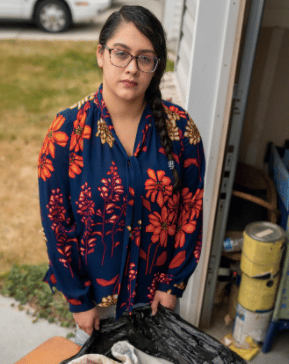If you tell police they can go into your home, does that mean they can also legally stand outside and pepper it with shotgun-fired tear gas grenades—destroying everything inside?
That is the question asked by a petition to the Supreme Court of the United States filed today by the Institute for Justice (IJ) on behalf of Idaho resident Shaniz West.
Shaniz’s nightmare started when she stopped home with her children in tow one afternoon in 2014 to find her house surrounded by five local police officers. They told her they were looking for her ex-boyfriend, who was wanted on firearms charges. Shaniz said she didn’t think he was in her home—he certainly wasn’t supposed to be—but she said that the officers could go in to see for themselves.
Read about IJ’s new Project on Immunity and Accountability
But the officers did not even try keys she gave them: Instead, they called in the local SWAT team and laid siege to the house, bombarding it from the outside with tear-gas grenades. When it was all over, Shaniz’s home and all her possessions were destroyed and (just as Shaniz had said) the ex-boyfriend was nowhere to be found. Instead, the police had spent half a day bombarding and besieging a house that was empty except for Shaniz’s dog, Blue.
With her life in shambles, her personal property either destroyed or coated in a toxic film leftover from the tear gas, Shaniz—who was left homeless for months following the siege—sued to challenge the warrantless destruction of her home and property. The officers defended their actions by claiming that they didn’t need a warrant because Shaniz had given them consent to go into the home. Amazingly, the judge bought the police’s defense.
Government officials are not above the law, and if citizens must follow the law, the government must follow the Constitution—that includes being held accountable for violating it.
The reason is a controversial legal doctrine called “qualified immunity,” which the U.S. Supreme Court created in 1982. Under qualified immunity, a government official can only be held accountable for violating someone’s constitutional rights if the violation is “clearly established.” That means law enforcement officials can only be held accountable if a court has previously ruled that exactly what they did is unconstitutional—thus putting them on notice that they cannot do something, even if that something is clearly unreasonable, unethical, or unconstitutional. So, if a government official finds a new and unique way to violate someone’s constitutional rights, there is little that can be done to hold the official accountable.
“No judge has ever ruled that what these officials did to Shaniz was legal,” explained IJ Senior Attorney Robert McNamara. “After all, anybody who has ever thrown a dinner party understands that an invitation to go inside your home is not the same thing as an invitation to destroy it. But under qualified immunity, courts say it doesn’t matter whether a reasonable person would have thought they were acting legally. It only matters whether a court has already decided that an official who did exactly the same thing in exactly the same circumstances. If your exact case hasn’t come up before, you’re out of luck.”
In Shaniz’s case, the United States Court of Appeals for the Ninth Circuit did not find that it was either right or wrong for officers to destroy her house and everything in it. Rather, it simply said that “no Supreme Court or Ninth Circuit case clearly established, as of August 2014, that Defendants exceeded the scope of consent.” And that was the end of the case.
“Qualified immunity means that government officials can get away with violating your rights as long as they violate them in a way nobody thought of before,” said IJ Attorney Joshua Windham. “Government officials are not above the law, and if citizens must follow the law, the government must follow the Constitution—that includes being held accountable for violating it.”
That is why Shaniz has joined forces with IJ to ask the Supreme Court to hear her case and establish once and for all that qualified immunity cannot be used to allow government officials to violate constitutional rights with impunity. IJ, through its new Project on Immunity and Accountability, seeks to ensure that the Constitution provides a government that is limited in fact, not in theory, and that constitutional promises of property rights, free speech, due process and other rights are actually enforceable.
“Shaniz West is just one of countless Americans whose rights have been violated but who has been turned away at the courthouse door by baseless rules about government immunity,” concluded IJ President and General Counsel Scott Bullock. “The Constitution is a promise that is meant to be kept, and people who swear an oath to that Constitution should be required to keep it. We at IJ plan to see that they do.”
Reprinted from the Institute for Justice.
































